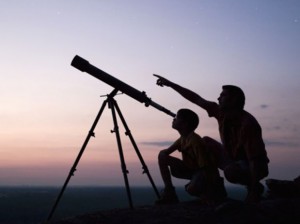Why the Believer Knows More About Science
 If I had to name the most important topics in science during our time, they would probably be evolutionary biology, cosmology, particle physics, and psychology to understand the human person better.
If I had to name the most important topics in science during our time, they would probably be evolutionary biology, cosmology, particle physics, and psychology to understand the human person better.
However, if I had to name the most important issue in science today, it would be something more over-arching. It would be the general issue of metaphysics and philosophy applied to scientific research and interpretation.
This isn’t something I understood even as a scientist in academia or the industry. It isn’t taught, discussed or even admitted. But it’s as obvious as the clouds in the sky, which is probably why this is something I’ve learned studying theology.
Among Catholics, it’s standard practice to try to comprehend the mysteries of nature within the context of the mysteries of faith. The way scientific data is interpreted will be guided by philosophy, and more importantly, an overall metaphysical principle, what some would call a “worldview.” A perusal of the documents from the Pontifical Academy of Sciences makes this concept obvious, even in the papers presented by different scientists. It is especially apparent inPope Benedict XVI’s opening address to participants of the Plenary Session of the Pontifical Academy of Sciences in 2010 (pages 23-24).
Again, this is nothing new. It’s the way Aristotle viewed knowledge, the way the Scholastics viewed knowledge, and it is traditionally the way Catholics viewed knowledge. Faith is nota human invention. The believer bases faith on Divine Revelation, and bases science on Creation. Both have their common source in God, the Eternal Truth. It is true, the believer is less free in his knowledge than the unbeliever, but only because he knows more.
The non-believer has one source of knowledge – reason.
The believer has two – faith and reason.
For the philosophical Modernist who fundamentally denies objective truth and replaces it with experiential, sentimental (i.e. subjective) truth, the data collected from experiments to test a hypothesis can be interpreted according to his own particular worldview. Whatever it may be…
For instance, if he is an atheist who denies the existence of God, then the (perhaps unspoken) metaphysical principle guiding his research and conclusions is to show that science can explain the universe without needing to “invoke” God (e.g. Hawkings), or to show God is unnecessary. This will be the case whether it is cosmology, evolutionary biology, physics, or psychology, and whether said scientists are in the lab, at a conference, or scribbling competitively on napkins in a bar. No God.
I’m not sure yet how the Catholic Modernist would refute such an atheist without knocking the legs out from under his Modernism (as defined by Pope Pius X) for he must allow the atheist to interpret his own data according to his own worldview – as if it were true. But false worldviews cannot bring about true conclusions in science. If there is no objective truth external to man, there is no true science.
Relativism destroys the essence of science, and reduces it all to mere opinion.
The Catholic scientist follows a different metaphysical principle, that God is the Author of all truth, Creator of all things. Every experiment is designed guided by this principle, every set of data is interpreted by this principle, every new hypothesis is formulated by this principle.
Pope Benedict XVI begins his address in 2010 by noting that the twentieth century is one of major achievements in science, which has led to two extreme characterizations. Because science has advanced so fast, many have come to view science as the way to answer all questions of our existence and hopes, and others have come to fear it as a means by which we will destroy ourselves. The first group has lost faith in God; the second in man.
Pope Benedict XVI points out that neither extreme is correct.
Science should remain a “patient yet passionate search for truth about the cosmos, about nature and about the constitution of the human being.” There will always be successes and failures in science, but exciting new discoveries lead to better understanding allowing for the improvement of theories. Science approached this way becomes a an “unveiling” of man’s intellectual connection with natural reality. And as generations progress, so too will science.
In the twentieth century we have understood our place in the cosmos better, at both the grand and the infinitesimal scales. In science the common denominator for all experimentation is that it is a systematic method of observing nature. Because it is not always possible to directly observe nature at these scales, an even stronger impetus to be aware of a metaphysical or philosophical guiding principle thus results. The Church is convinced that science benefits from man’s spiritual dimension and his acknowledgement that there is a world independent of him, with inherent logic, and also a world that he does not fully understand.
“Scientists do not create the world.” Rather, they learn about it, try to imitate it, and follow its laws. In this way the scientist – a human being – is observing a constant – a logos – that he has not created. Science, then, necessarily leads him to admit the existence of God, “All-Powerful Reason,” which sustains the world. That is where science and religion meet.
“As a result, science becomes a place of dialogue, a meeting between man and nature and, potentially, even between man and his Creator.” – Pope Benedict XVI
Sources:
Hagen, J. (1912). Science and the Church. In The Catholic Encyclopedia. New York: Robert Appleton Company.
Pascendi Dominici Gregis, Encyclical of Pope Pius X on the Doctrines of the Modernists (1907).
The Scientific Legacy of the 20th Century. The Proceedings of the Plenary Session, October 28-November 1, 2010. Vatican City (2011).

